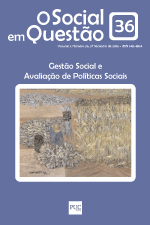Edição
O projeto Produtores de Água e Floresta em Rio Claro-RJ: uma análise da governança no projeto sob a ótica da gestão social
Diná Andrade Lima Ramos, Francine Ramalho de Aguiar e Lamounier Erthal Villela
The project Producers of Water and Forest in Rio Claro-RJ: an analyses of governance in the project under the perspective of social management

A Bacia Hidrográfica do Guandu é responsável pela produção de água do principal manancial de abastecimento público que atende 80% da região metropolitana do Estado do Rio de Janeiro (RJ). Este potencial hídrico levou à criação do projeto Produtores de Água e Floresta (PAF), que se propõem a aplicar o modelo provedor-recebedor através de um pagamento por serviços ambientais. O objetivo desta pesquisa é analisar se os proprietários rurais participam do processo de planejamento e execução do projeto implementado em Lídice, Distrito de Rio Claro, município do RJ, como prevê o paradigma da Gestão Social, a ponto de possibilitar o êxito das ações durante e após o projeto.Trata-se de uma pesquisa qualitativa. Foi feita uma investigação de campo e aplicado um questionário estruturado com perguntas abertas, considerando a representação dos atores na estrutura do PAF e não a amostra estatística. A análise dos questionários indicou que não é possível afirmar que haja um interesse bem compreendido e um objetivo comum por parte proprietários rurais quanto ao verdadeiro objetivo do projeto, que é a conservação da água por meio da preservação e recuperação das florestas. Acapacidade de articulação e negociação da Unidade Gestora do projeto pode estar comprometida, na medida em que esta não prevê um espaço de diálogo que reúna os proprietários rurais, a sociedade civil organizada e o poder público. O frágil enraizamento dos proprietários rurais nas atividades do PAF afeta sua autonomia e a possibilidade de dar continuidade das ações do projeto.
Palavras-chave
Pagamentos por Serviços Ambientais; Produtores de Água e Floresta; Governança; Gestão Social.
Title: Paradoxes for solving the complaints of sexual violence from the perspective of guardianship counselors

The Hydrographic Basin of Guandu is responsible for the production of water of the main source of public supply that servesto 80% of the Metropolitan Region of the State. This water potential led to the creation of the project Water and Forest’s Producers5, which propose to apply the model provider-receiver through a payment for environmental services. The objective of this research is to analyze if the landowners participate of the process of planning and execution of the project implemented in Lídice, District of Rio Claro, municipality of Rio de Janeiro, how predicts the paradigm of the Social Management, as to enable the success of actions during and after the project. This is a qualitative research. A field investigation was conducted and applied a questionnaire structured with open questions, considering the representation of actors in the PAF structure and not a statistical sample. The analysis of the questionnaires indicated that it is not possible to say that there is a well-understood interest and a common goal by landowners as to the true purpose of the project, which is the conservation of water through the preservation and restoration of forests. The joint forces and the negotiation’s capacity by Management Unit of the Project may be committed, to the extent that this does not provide a space for dialogue bringing together landowners, organized civil society and the government. The fragile rooting of landowners in the PAF activities affects their autonomy and the possibility of continuing the project’s activities.
Keywords
Payment for Environmental Services; Water and Forest’s Producers; Governance; Social Management.
LICENÇA CREATIVE COMMONS
 Esta obra está licenciada com uma licença
Esta obra está licenciada com uma licençaCreative Commons Atribuição-NãoComercial 4.0 Internacional.












